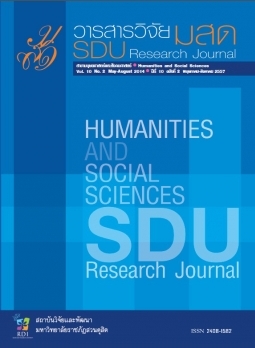Developing Potential of Restaurant Entrepreneurs in Pattaya Using Process of Knowledge Management of Local Wisdom on Foods
Keywords:
entrepreneurs’ potential, knowledge management,, local cuisine wisdomAbstract
This research mainly aims to find guidelines for developing restaurant
entrepreneurs’ potential using knowledge management (KM) process on local food wisdom to achieve standardized restaurant businesses and enhance Pattaya local foods for tourist recognition. The mixed methodology research was adopted and data gathering was performed by sample survey, in-depth interviews, small group discussion, observation, and participatory action research led by experts and
researchers about knowledge management process for local food wisdom,
demonstrated local food cooking for entrepreneurs, participated in exchange
learning activities and experiment, accomplished the lesson learned, summarize issues and solutions. The findings revealed the guidelines recommended for
developing the potential of restaurant entrepreneurs’ potential using KM process on local food wisdom by developing: 1) team work responsible for administration and managing the KM of Pattaya local cuisine wisdom, 2) database management systems for storing bodies of all knowledge concerning Pattaya local cuisine wisdom,
networking, as well as providing users knowledge, 3) the KM process for Pattaya local cuisine wisdom to define the knowledge management practices and learning activities between entrepreneurs and stakeholders continuously, 4) learning sources for Pattaya local cuisine wisdom to organize the local cuisine wisdom sources and activity services in communities, and 5) public relations and marketing promotions for local cuisine businesses to organize the publicity campaign events to ensure that all sectors realize and value conservation and succession for Pattaya local cuisine wisdom.
References
Retrieved June 15, 2016, from http://www.diva-portal. org/smash/get/diva2:636711/FULL TEXT01.pdf. Boonnark, A. (2015). The Behavior of Thai Tourist toward Local Thai Food Consumption in Southern part of Thailand. Siam University. Retrieved June 10, 2016, from
http://www. researchsystem.siam.edu/images/thesisphd/ The_Behaviorof_Thai_Tourist_toward_Local_ThaiFood_ Consumption in the Southern part_of_Thailand. Chimbanrai, H. & Wongsarote, R. (2013). Potential of Local Food and Guidelines for Tourism Promotion through Local Food of Nan Province. Vol.11 No.1 (2015). pp 37-53. Retrieved June 15, 2016, from https://tci-thaijo. org/index.php/jitt/article /view/65741. Karim, A. S. (2006). Culinary tourism as a destination attraction: an empirical examination of the destination’s food image and information sources. Oklahoma State
University. (pp.1-188). Office of Tourism Development. (2010). Annual report 2009. Bangkok: Office of Tourism Development. Panich, W. (2006). Knowledge Management for Practitioners. (3rd edition). Bangkok: Sukpapjai. Pattaya City Permanent Secretary. (2014). Basic Information. Retrieved December 15, 2014, from http:// www.pattaya. go.th/ city-information /. Ratinthorn, S. (2014). The Push and Pull Factors Affecting to the Decisions of Chinese Tourists in Choosing Thailand as Their Destination. Retrieved June 17, 2016, from https://www. google.co.th/?gws_rd=cr,ssl&ei=o8BjV96MEMLZvATSirWoBg#q=%.
Yamane, T. (1970). Statistic and Introductory Analysis. (3nd ed). Singapore : Time Printers. Bhd. Yambunjong, P. & Gulasirima, R. (2012). Thai Local Food Menus’ Developing of Restaurant for Tourists: A Case Study of Pattaya, Cholburi Province, Thailand.
Bangkok: Office of the Higher Education Commission.








